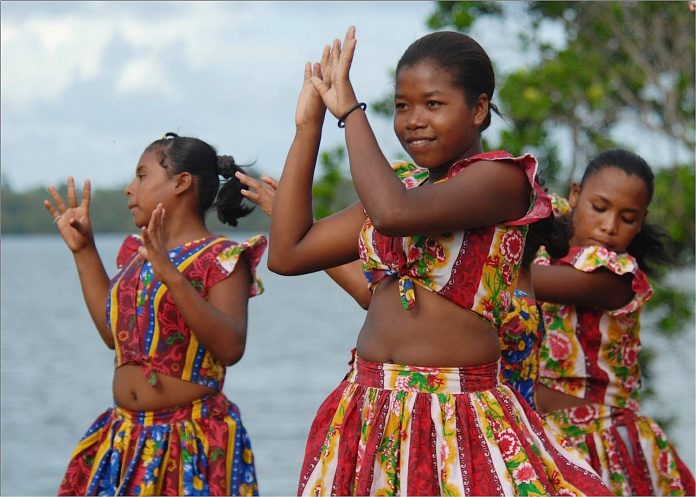ECLAC’s Executive Secretary, Alicia Bárcena, and the President of the Fund for the Development of the Indigenous Peoples of Latin America and the Caribbean, Myrna Cunningham, presented a study today that addresses the reality of indigenous peoples in the region.
The more than 800 indigenous peoples present in Latin America should take a leading role in decision-making spaces, not only to safeguard their right to self-determination but also because of the significant contributions they can make to reformulating development models, the Economic Commission for Latin America and the Caribbean (ECLAC) and the Fund for the Development of the Indigenous Peoples of Latin America and the Caribbean (FILAC) underscored today in a joint publication.
The study entitled The Indigenous Peoples of Latin America – Abya Yala and the 2030 Agenda for Sustainable Development: Tensions and Challenges from a Territorial Perspective was presented by Alicia Bárcena, ECLAC’s Executive Secretary, and Myrna Cunningham, President of FILAC, in a virtual launch event moderated by Javier Ciurlizza, Director of the Ford Foundation’s Office for the Andean Region.The study by ECLAC and FILAC raises the visibility of the situation of indigenous peoples and presents an updated overview of the state of territorial rights and of forests, and the demography and right to well-being of the indigenous peoples of Latin America, with the aim of contributing to follow-up on the 2030 Agenda’s implementation and to the urgent actions needed to accelerate compliance with the commitments that the region’s countries have taken on.
According to the document, the indigenous population in Latin America – Abya Yala is estimated at 60 million people, which represents 10% of the region’s total, belonging to more than 800 different indigenous peoples. It adds that, 30 years since the adoption of the Indigenous and Tribal Peoples Convention 1989 (No. 169) by the International Labor Organization (ILO), and even though Latin American States have fully recognized the rights of indigenous peoples, this collective continues to be among the groups that lag the furthest behind in economic and social terms, even when the region has achieved major progress in this area.
The study specifies that one of the most important challenges that the region’s countries face is the forging of societies that are institutionally pluricultural, diverse, inclusive, equitable and non-discriminatory, where the rights of indigenous peoples are effectively recognized and guaranteed. “The 2030 Agenda for Sustainable Development, adopted by the nations of the world in 2015, can constitute a great opportunity in this sense, if due and proper attention can be paid in the next ten years to harmonizing its Goals and their corresponding targets with indigenous peoples’ collective rights,” the document emphasizes. With that aim, it calls for creating the legislative, institutional, political and economic conditions that would reflect existing diversity and give concrete shape to the commitment assumed by the world’s countries in 2014 – in the framework of the World Conference on Indigenous Peoples – to recognize, respect, promote, advance and not diminish in any way the rights of aboriginal communities and to defend the principles of the United Nations Declaration on the Rights of Indigenous Peoples.
During the launch of the study, Alicia Bárcena, ECLAC’s Executive Secretary, called for guaranteeing the collective rights of the indigenous peoples of Latin America and ensuring they are not left behind on the path to sustainable development. She warned that processes for criminalizing indigenous peoples’ territorial demands are a widespread phenomenon in the region, which unfortunately are on the rise. She specified that in Latin America, there are 1,223 land conflicts that have prompted mobilizations by indigenous peoples, which have been met with repression and criminalization. As a result, 232 defenders of indigenous life and territory were murdered between 2015 and the first half of 2019, which means that, on average, four indigenous defenders are murdered in the region each month.
The senior United Nations official warned that the indigenous population continues to experience a higher level of poverty than non-indigenous people and that the wage inequalities between indigenous workers and non-indigenous ones intensify according to education level and gender.
“We must put an end to the culture of privilege that naturalizes inequalities and different types of discrimination, which we have inherited from colonial times. We have to defeat the culture of privilege and move towards a culture of equality that shows special respect for the great wealth of indigenous peoples. Abya Yala is a fully mature land, with lifeblood, and where guaranteeing indigenous peoples’ rights is an urgent matter,” she affirmed.
Meanwhile, Myrna Cunningham, President of FILAC, noted that the document reflects a reality that the COVID-19 pandemic has revealed: the intensification of racism, exposure of the inequality existing between indigenous peoples and other sectors of society, and the crisis of the economic model that prevails in our region. “The document contributes elements that can help us to respond to the current emergency situation, but also to earnestly begin to recognize, as a region, the contributions of indigenous peoples that are based on their abilities, on their traditional knowledge, on their capacity for governance and articulation between the national, local and international spheres,” she expressed.




















